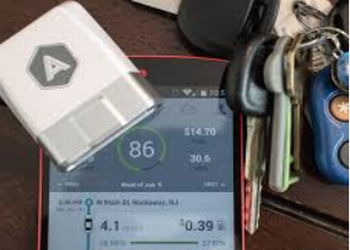
By Mike Sheldrick, Senior Editor
Call it what you will — the smart car, the connected car, or maybe even the autonomous vehicle. They all may seem a long way off, but maybe not.
In fact, many cars now include lane departure warnings, collision warnings, real-time fuel consumption, etc.
While the automakers, aftermarket hardware manufacturers, and software giants work on the acceptable standards for future cars, a group of start-ups is hoping to get a leg up on the industry by offering devices and applications that will provide many of the functions and features of new cars just hitting the market and those planned for the future.
These new entrants — Automatic Labs, Mojio, Zubie and Metromile are key among them but by no means alone. They are still in the startup stage, but have lined up some some impressive backers. Mojio, for instance, has support from Telus, the Canadian communications giant, and in the U.S. with AT&T, and Zubie has received $8 million in backing from Nokia’s connected car fund and has formed a partnership with Progressive Insurance. Automatic is testing integration of its solution with Ford’s Sync. Metromile is offering insurance policies whose rate is based on driving data that their device collects.
The upstarts all have one thing in common. They are using a diagnostic port —OBD II, for the geeks. This data port provides a lot of data that can be used to provide information on location, speed, fuel consumption, etc. Several of the newcomers’ devices have GPS, or one can be added, or an accelerometer for navigation as well as measuring braking, jack-rabbit starts and swerving. Cars also have a data bus, which provides more sophisticated data, and a flood of data are also accessible, but it is not used by many of the new aftermarket devices.
The new crop of solutions has another thing in common. Low price. The Automatic device is $99.00, without a subscription fee and connects to an iPhone or Android device via Bluetooth. Mojio’s unit is $149 with a year of free service. After that, the service fees are $4.95 a month. That’s because unlike Automatic, which communicates with an iPhone or Android device via Bluetooth, Mojio sends data to the cloud, and then back to the iPhone or Android device. Automatic’s plan is to offer a complete package including hardware and software. Mojio is positioning itself as a software platform that will be utilized by independent software developers to offer applications. Metromile offers substantially lower insurance prices. All suppliers suggest fuel savings of up to 25% or more.
The startups hope to tap into a huge existing market: 100 million or more older cars on the road, bringing them up to date with new applications on a user’s smart phone. These include driver behavior management, parking-spot availability and the location where the car is parked for those who’ve “misplaced” it, or wish to share it with an approved buddy. Not least is the actual information of those pesky check engine lights. Some include automatic calls to 911 after serious collisions.
Automatic has just released a teenager driver coaching app that prompts young drivers to operate safely through prompts, and the ability for mom and dad to review drives. That could promote greater family harmony.
The new entrants are also eyeing the possibility of providing fleet and asset management information at a new, substantially lower cost than current solutions. “There’s definitely room for a low-cost asset management solution,” says Clem Driscoll, president of C.J. Driscoll & Associates and a long time market researcher for fleet telematics, tracking and asset management.
“For some fleets, the limited amount of information of these newer devices may be enough.” Driscoll estimates that only about 1/4 of the vehicles of the 15 million-plus in commercial fleets are equipped with fleet management systems, so there is plenty of room to grow market, which Driscoll says has been increasing at about 15% per year.
Existing telematics suppliers are also moving to add similar features to their offerings. Geotab, one of the world’s largest fleet management solutions, recently released the GO7, which reads data off the OBD port, as well as any one of several data uses in common use. Not only can real-time location data now be read, analyzed and acted on, but so can a great many engine and operating systems data.
Last week, Geotab announced that it will partner with Telefonica, the European and South American telecommunications giant. The pair will offer real-time fleet management, the ability to develop a number of alerts, notifications, and review of driver trip and activity reports. Additionally, the new features will include on-board diagnostics; engine fault code diagnosis; detection of accidents and retrace of the causes of the accident.
All of the startups began in the consumer market, but they are quickly moving beyond that. Both Automatic and Mojio say they are working with fleet management companies, and expect to announce deals soon. They say that they aim to integrate their software into the solutions that the fleet management companies have provided to their customers.
Our plan is to monitor this space closely. We think that success of these companies could have a significant effect on fleet management, from tracking to driver behavior. On the one hand, it’s true that fleets will be able to buy newer cars with all the smart car bells and whistles. On the other, after-marketers can prove to be much more nimble. History doesn’t always repeat itself, but it is interesting to note that the car radio came from aftermarket suppliers – most famous among them, Motorola.




